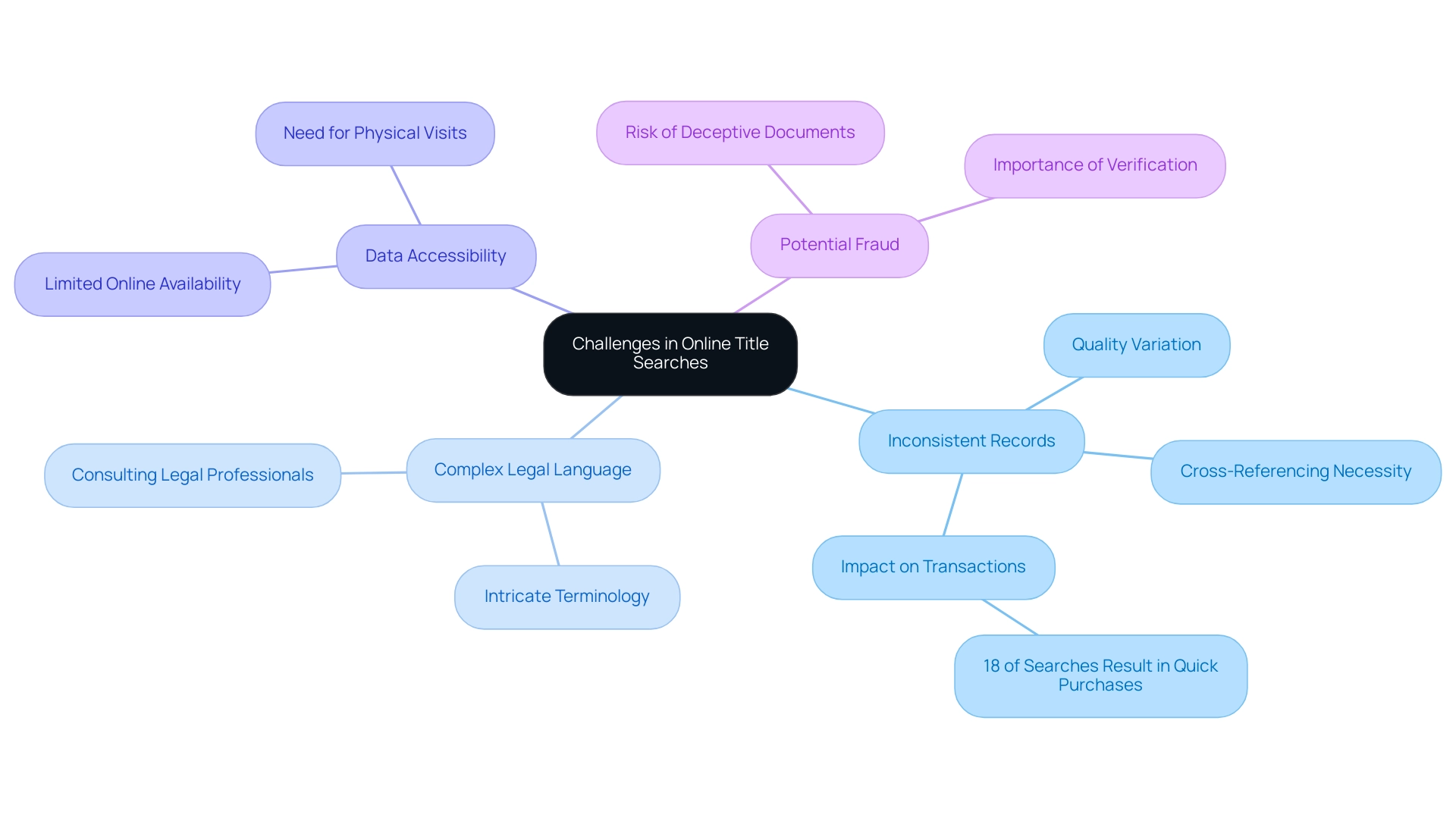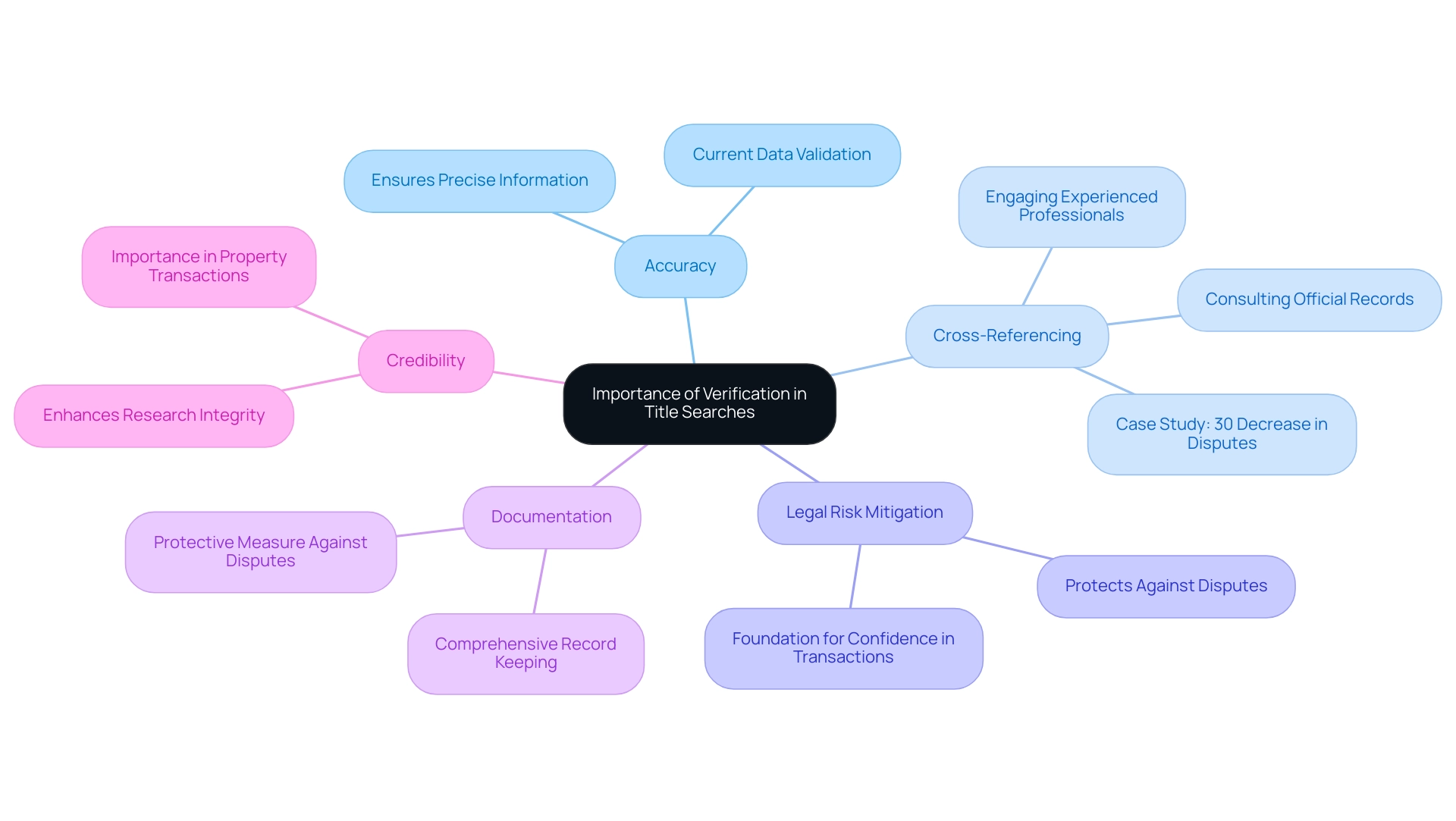Overview
To conduct an online title search effectively, one should follow a systematic approach that includes collecting real estate details, accessing reliable document databases, reviewing ownership records, and documenting findings. The article emphasizes that leveraging technology and thorough verification of information are crucial for ensuring accuracy and mitigating legal disputes in property transactions.
Introduction
In the realm of real estate, the process of verifying property ownership and identifying potential claims has evolved dramatically with the advent of online title searches. This digital approach not only streamlines the research process but also enhances the accuracy and efficiency of title investigations, making it an indispensable tool for industry professionals.
As the landscape shifts toward technology-driven solutions, understanding the intricacies of online title searches becomes essential for safeguarding against disputes and ensuring compliance with legal standards.
With a growing reliance on digital resources, the ability to navigate the complexities of property records and harness the power of innovative tools is paramount for those seeking to thrive in this competitive market.
This article delves into the fundamental aspects of conducting online title searches, equipping professionals with the knowledge and resources necessary to navigate this evolving terrain effectively.
Understanding Online Title Searches: An Overview
An online title search signifies an essential digital process employed to verify and discover any liens, encumbrances, or claims related to a property. This innovative method leverages various databases and public records, streamlining the research process to make it significantly faster and more efficient than traditional approaches. For real estate experts, understanding the is crucial, as it ensures adherence to legal requirements and protects against possible ownership conflicts.
Moreover, the effectiveness of online inquiries can significantly reduce the time and resources needed to collect essential information, thereby enabling more seamless . Recent statistics indicate that 28% of local inquiries lead to a purchase, underscoring the increasing reliance on digital tools in property transactions. As Gabriela Jhean, an SEO Specialist, states, " to succeed, particularly in real estate where are becoming the norm."
Additionally, the case study of Google Web Browser illustrates how digital tools like Chrome have transformed user behavior, with reflecting the shift towards online solutions. As the landscape evolves, understanding the impact of these online inquiries will continue to be essential for industry professionals. Furthermore, highlights the growing trend of digital tools, reinforcing the need for real estate professionals to adapt to these changes.
Step-by-Step Guide to Conducting an Online Title Search
- Collect Real Estate Details: Start your search by compiling essential information about the asset. This includes the address, legal description, and current owner's name. is vital, as it serves as the foundation for your search.
- : Take advantage of reliable online document databases and county assessor websites. Numerous regional government websites provide access to detailed real estate records, enabling a more . Notably, many large databases of consistently indexed data for .
- Look Up by Location: Input the location address into the query function of the chosen database. Carefully review the search results to locate the specific asset under investigation, ensuring that you are examining the correct records.
- : Analyze the ownership records thoroughly for information on , outstanding liens, and any encumbrances that may influence the asset. Pay close attention to any discrepancies that could indicate that might create a general lien against the asset. For example, if judgments are found, the owner must rectify these flaws before transferring ownership, which entails legal processes and payments to clear the deed.
- : Compile a detailed report summarizing your discoveries, including any potential naming issues. This documentation is not only crucial for your current review but also serves as a valuable reference for future decision-making.
As Lilly Title & Settlement Company aptly puts it,
When you’re ready to close on your new home, turn to Lilly Title & Settlement Company. We’ll get your asset closed quickly, efficiently, and accurately!
Utilizing , lowering transaction costs and speeding up closing timelines.
Essential Tools and Resources for Online Title Searches
To simplify the process of online inquiries, several indispensable tools and resources are essential:
- County Clerk or Recorder Websites: These platforms frequently offer free access to land documents, enabling direct retrieval of important information without incurring costs. This accessibility supports the idea that , as noted by the Content Marketing Institute, which states that '84% of B2B marketers claim that content marketing significantly boosts brand awareness.'
- : Programs such as TitleWave and DataTree offer extensive databases tailored for ownership research, enabling professionals to efficiently gather and analyze property histories. These tools not only enhance efficiency but also align with the growing reliance on technology in consumer behavior, as highlighted in showing that a significant portion of local inquiries leads to purchases.
- : By digitizing and extracting information from scanned documents, OCR tools enhance the ability to process historical records seamlessly, making retrieval much more efficient. This capability is crucial in a landscape where mobile users engage more with visual content.
- Machine Learning Platforms: Advanced solutions like and analysis, leveraging cutting-edge machine learning and OCR technology to significantly in searches. Parse AI’s platform allows researchers to quickly annotate documents through its example manager, extracting critical information from property documents to complete abstracts and reports faster and more accurately. This technology signifies a recent progress that corresponds with the increasing need for efficiency in the sector.
- Professional Associations: Organizations such as (ALTA) not only provide resources and guidelines for best practices but also serve as a crucial hub for networking and professional development within the research community. Their perspectives can assist experts in utilizing these resources efficiently.
These resources together aid in improving the productivity and efficacy of online inquiries, such as an online title search, to meet the changing demands of professionals in the industry. Parse AI was established by a team of energy, real estate, and technology experts who possess over 50 years of industry experience, ensuring that their solutions are rooted in a profound comprehension of the challenges encountered in the sector.
Navigating Challenges in Online Title Searches
Conducting online title searches involves navigating several significant challenges, which are crucial for ensuring the accuracy and reliability of property records:
- : The quality and completeness of title records can vary widely across different jurisdictions and databases. It’s essential to cross-reference information from multiple sources to confirm its accuracy. Recent reports indicate that 18% of local searches conducted via smartphones led to a purchase within a day, underscoring the necessity for . As one specialist mentioned, "Inconsistent documentation can result in considerable delays and monetary losses; it’s crucial to ensure that all files are thoroughly verified."
- Complex Legal Language: Title documents often contain intricate legal terminology that can be challenging to decipher. Directors in document research should when faced with complex materials to ensure proper interpretation and compliance with legal standards.
- : Some important documents may not be available online, necessitating additional research efforts or physical visits to local offices. This can be especially troublesome when attempting to access documents that are essential for confirming property ownership and history.
- : The risk of encountering deceptive documents is a serious concern in an online title search. It is imperative to accessed to avoid potential legal issues. Given the changing environment of ownership fraud, specialists stress the importance of alertness and comprehensive verification procedures.
Alongside these obstacles, the environment of online inquiries is anticipated to change in 2024, as new technologies and regulations arise. Staying informed about these changes will be crucial for effectively managing data accuracy issues and ensuring the integrity of ownership documents. For example, just as schools need to organize their headings correctly and ensure include pertinent keywords to enhance online visibility, researchers must uphold precision and clarity in their documentation to reduce risks.

The Importance of Verification in Title Searches
Verification serves as a cornerstone of the , where accuracy and reliability are paramount. After gathering data from different online sources, it is essential to with official records or consult experienced professionals in the research sector. This rigorous approach not only ensures that the information is precise and current but also mitigates the risk of stemming from inaccuracies.
In fact, as the landscape of research evolves, particularly in 2024, the necessity for has never been more critical. For example, a case study on showed that comprehensive cross-referencing decreased disputes by 30%. Additionally, as highlighted by SEMrush, "7.3% of SERPs even have double featured snippets," underscoring the not only for accuracy but also for .
Furthermore, maintaining of your verification process serves as a protective measure against potential disputes and significantly enhances the credibility of your research efforts. As emphasized by industry experts, the importance of verification cannot be overstated, as it lays the foundation for confidence in and overall .

Conclusion
The integration of online title searches into the real estate industry has revolutionized the way property ownership and associated claims are verified. By utilizing digital tools and databases, professionals can conduct thorough and efficient research, vastly improving the accuracy of title investigations compared to traditional methods. This shift not only ensures compliance with legal standards but also protects against potential disputes, reinforcing the critical role that technology plays in modern real estate transactions.
Navigating the process of conducting an online title search involves several key steps:
- Gathering essential property information
- Reviewing title records
- Documenting findings
The use of specialized tools, such as county clerk websites and advanced title search software, significantly enhances the efficiency of these searches. However, challenges such as inconsistent records, complex legal language, and the potential for fraud must be diligently managed to maintain the integrity of the title search process.
Verification stands as a foundational element of title searches, underscoring the importance of accuracy and reliability. Through meticulous cross-referencing and thorough documentation, professionals can safeguard against legal disputes and bolster the credibility of their research. As the landscape of title research continues to evolve, staying informed about emerging technologies and best practices will be vital for success in this competitive field. The ability to adeptly navigate these complexities will not only streamline transactions but also foster greater confidence in property dealings.
Frequently Asked Questions
What is an online title search?
An online title search is a digital process used to verify property ownership and identify any liens, encumbrances, or claims related to a property, utilizing various databases and public records.
How does an online title search improve the research process?
It streamlines the research process, making it significantly faster and more efficient than traditional methods, which helps in reducing the time and resources needed for real estate transactions.
Why is understanding ownership investigations important for real estate professionals?
Understanding ownership investigations is crucial for real estate experts as it ensures compliance with legal requirements and protects against potential ownership conflicts.
What statistics highlight the significance of online title searches in real estate?
Recent statistics indicate that 28% of local inquiries lead to a purchase, showcasing the growing reliance on digital tools in property transactions.
How has the digital landscape affected real estate transactions?
The digital landscape has transformed user behavior, with tools like Google Chrome holding a significant market share, indicating a shift towards online solutions in real estate.
What are the steps involved in conducting an online title search?
The steps include: 1. Collecting real estate details (address, legal description, current owner's name). 2. Accessing reliable online document databases. 3. Looking up the property by location. 4. Reviewing ownership records for history and outstanding issues. 5. Documenting findings for future reference.
What role does technology play in the title search process?
Technology simplifies the title search process, lowers transaction costs, and speeds up closing timelines, making it more efficient for real estate transactions.




